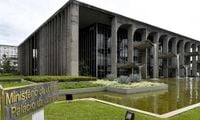In a significant meeting held on May 6, 2025, representatives of the Trump administration engaged with Brazilian officials to discuss the potential classification of two notorious Brazilian criminal organizations, Primeiro Comando da Capital (PCC) and Comando Vermelho (CV), as terrorist groups. This request was presented during discussions with technicians from Brazil's Ministry of Justice and Public Security (MJSP) in Brasília.
The U.S. delegation, led by David Gamble, the interim head of Sanctions Coordination at the U.S. Department of State, argued that such a classification would enable the imposition of more severe sanctions against these factions. According to the U.S., both PCC and CV have established a presence in twelve U.S. states and are allegedly using American territory to launder money, which has raised concerns among U.S. authorities.
However, Mario Sarrubbo, Brazil's national secretary of Public Security, firmly disagreed with the U.S. proposal. He emphasized that Brazilian law does not categorize these groups as terrorist organizations, stating, "First of all, because this classification does not fit into our legal system, as these factions do not act in defense of a cause or ideology, but rather seek profit through various illicit activities." Sarrubbo highlighted that the Brazilian government has been actively developing public policies to combat these factions and strengthen cooperation with other Latin American countries.
During the meeting, Sarrubbo reiterated that the Lula administration has been proactive in addressing the challenges posed by organized crime, including ongoing efforts to enhance collaboration with neighboring countries to tackle these issues collectively.
In a related context, the U.S. embassy revealed that in the past year, it had denied visas to 113 individuals identified as having connections to PCC and CV. This move underscores the U.S. government's commitment to addressing the influence of these organizations beyond Brazil's borders.
Gamble's visit was part of a broader initiative to discuss security issues with Brazilian authorities. The U.S. delegation included notable figures such as John Jacobs from the U.S. Embassy, judicial attaché Michael Dreher, senior advisors Ricardo Pita and John Johnson, political counselor Holly Kirking Loomis, and police attaché Shawn Sherlock. The Brazilian team at the meeting included officials from various ministries, including Foreign Affairs and Public Security, reflecting the importance of the discussions.
On the eve of the meeting, Flávio Bolsonaro, a senator from the state of Rio de Janeiro, provided the U.S. delegation with a dossier prepared by the security secretariats of Rio de Janeiro and São Paulo. This dossier purportedly linked the activities of PCC and CV to terrorism, citing alleged connections with Hezbollah. This move seems to have been aimed at reinforcing the U.S. perspective on the classification of these groups.
It's worth noting that the Brazilian legal framework distinguishes between organized crime and terrorism, with the latter carrying more severe penalties. According to Brazil's Anti-Terrorism Law (13.260/2016), the motivations behind terrorist acts are ideologically or politically driven, which is not the case for PCC and CV, who are primarily engaged in criminal enterprises for profit.
In stark contrast, the U.S. has previously classified other criminal organizations, such as Tren de Aragua from Venezuela and MS-13 from El Salvador, as terrorist groups under similar pretenses. This classification allows for harsher penalties and facilitates the deportation of members of these groups to facilities like the Centro de Confinamento do Terrorismo (Cecot) in El Salvador, should they be officially designated as terrorists.
Eduardo Bolsonaro, a federal deputy and son of former President Jair Bolsonaro, announced Gamble's visit prior to the meeting, indicating that discussions might also touch on potential sanctions against members of Brazil's Supreme Federal Court (STF), particularly targeting Justice Alexandre de Moraes, who has been a controversial figure in Brazilian politics.
As the meeting progressed, it became clear that the U.S. and Brazil have differing perspectives on how to address the challenges posed by these criminal organizations. While the U.S. seeks to label PCC and CV as terrorists to leverage international sanctions, Brazil maintains its stance that these groups are primarily engaged in organized crime without a political or ideological agenda.
The implications of these discussions are profound, as they could shape future cooperation between the two nations in addressing transnational crime. The U.S. has expressed a desire for Brazil to adopt a more stringent approach towards these organizations, while Brazil is focused on developing its own strategies that align with its legal and social frameworks.
As the dialogue continues, both countries are likely to face pressures from their respective political landscapes. In Brazil, the Lula administration is navigating a complex environment with various political factions, while in the U.S., the Trump administration is keen on showcasing its tough stance on crime and terrorism.
Ultimately, the outcome of these discussions may set the tone for how Brazil and the U.S. collaborate on security matters moving forward, particularly in combating organized crime that transcends borders.

